 Petzlover
Petzlover Carpatin is originated from Romania but Northern Inuit Dog is originated from United Kingdom. Carpatin may grow 8 cm / 3 inches shorter than Northern Inuit Dog. Carpatin may weigh 32 kg / 71 pounds more than Northern Inuit Dog. Both Carpatin and Northern Inuit Dog has same life span. Both Carpatin and Northern Inuit Dog has almost same litter size. Carpatin requires Low Maintenance. But Northern Inuit Dog requires Moderate Maintenance
Carpatin is originated from Romania but Northern Inuit Dog is originated from United Kingdom. Carpatin may grow 8 cm / 3 inches shorter than Northern Inuit Dog. Carpatin may weigh 32 kg / 71 pounds more than Northern Inuit Dog. Both Carpatin and Northern Inuit Dog has same life span. Both Carpatin and Northern Inuit Dog has almost same litter size. Carpatin requires Low Maintenance. But Northern Inuit Dog requires Moderate Maintenance
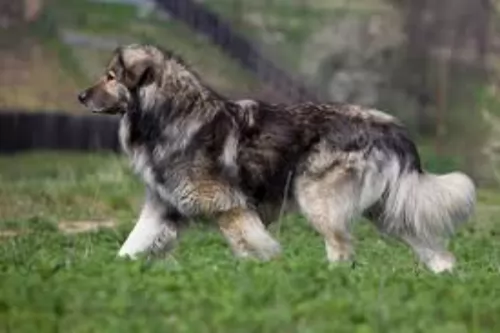 The Carpatin, known also as the Carpathian Shepherd Dog or Romanian Shepherd, is a large breed dog known for his guarding- and watch-dog abilities. Information about these dogs dates back to the 1800s, and much later, in March 1998, fans of the dog founded the Carpathian Shepherd Dogs Club.
The Carpatin, known also as the Carpathian Shepherd Dog or Romanian Shepherd, is a large breed dog known for his guarding- and watch-dog abilities. Information about these dogs dates back to the 1800s, and much later, in March 1998, fans of the dog founded the Carpathian Shepherd Dogs Club.
It is believed that the different Carpathian Shepherd Dog breeds are descendants from dogs that were developed thousands of years ago in Mesopotamia. Documentation of the origins of the dog are rare but it is thought that they are probable descendants of Lupomolossoids. However in 2005, it was finally recognized by the Federation Cynologique Internationale, and in 2006, it was recognized by the United Kennel Club. However, it is still a rare breed outside Romania.
 Looking at the beautiful Northern Inuit Dog, you’ll think that this crossbred dog is a wolf.
Looking at the beautiful Northern Inuit Dog, you’ll think that this crossbred dog is a wolf.
As with many other dogs, there are sometimes different stories regarding their history. It was in the 1980's that founder of the breed, Eddie Harrison, bred a number of mixed-breed rescue dogs with Siberian Huskies, German Shepherds and Alaskan Malamutes to produce the early Northern Inuit dogs. This is a dog that closely resembled a wolf in looks but which has the more companionable characteristics of the domesticated dog.
The dog is only recognized by its own independent breed club, but by none of the other major kennel clubs.
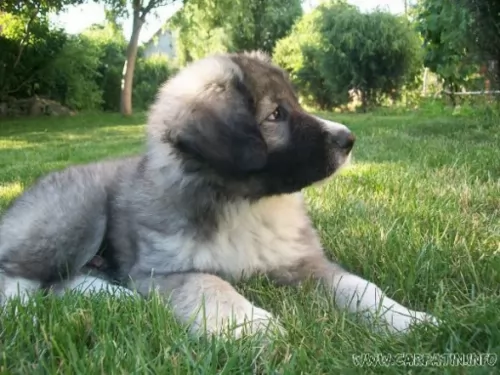 The Carpatin is a large breed dog, standing at 65 to 73cm in height and weighing between 32- and 80kg. The skull of the dog is wide and domed, the ears medium set and floppy. The neck is strong and muscled, the legs strong and straight, the chest deep.
The Carpatin is a large breed dog, standing at 65 to 73cm in height and weighing between 32- and 80kg. The skull of the dog is wide and domed, the ears medium set and floppy. The neck is strong and muscled, the legs strong and straight, the chest deep.
The tail of the Carpatin is long, bushy and high set and his coat is double layered, medium length and pale fawn in color with light grey to black shades being seen as well.
The Carpatin is patient, loving and protective. This is a strong-willed dog who is independent and fairly easy to train as he is intelligent.
It is a good idea to have him trained and socialized as this brings out the best in him. He is a patient and affectionate dog and he’ll get on well with children and tolerate other pets in the home.
They are wary of strangers and become vocal, barking and growling and taking their guard dog role seriously with strangers around.
 Friendly, calm and gentle, the Northern Inuit Dog is a crossbreed, described as a medium to large sized dog that stands at roughly 58– 81cm in height, male and female, and weighs in the region of 25–48kg.
Friendly, calm and gentle, the Northern Inuit Dog is a crossbreed, described as a medium to large sized dog that stands at roughly 58– 81cm in height, male and female, and weighs in the region of 25–48kg.
He has a double coat in typical wolf shades of grey, white, black and cream. He is regarded as a moderate shedder. The ears are erect, the face bright, intelligent and alert and the tail long, bushy and straight.
The Northern Inuit dog is independent, strong-willed and stubborn, and if you want to own one of these dogs, your dog will respond well if you are firm, fair, strong, kind and consistent. This is because the dog is stubborn, sharp, independent and intelligent.
The owner of such a dog must be a firm leader. Training and socialization should start when the dog is still young. He is good with kids, being playful and affectionate with them.
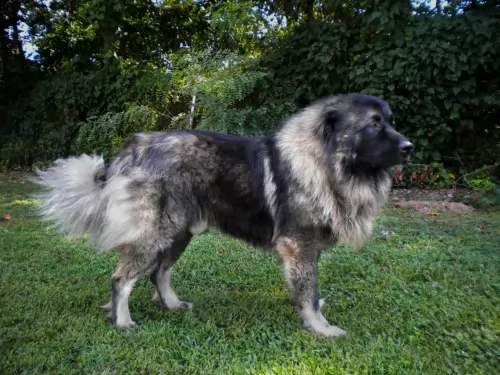 The Carpatin is a big, independent dog who loves his human family. He will guard them too and has all the intelligence and skills to be instinctively alert to danger. Territorial, he makes an excellent watchdog.
The Carpatin is a big, independent dog who loves his human family. He will guard them too and has all the intelligence and skills to be instinctively alert to danger. Territorial, he makes an excellent watchdog.
He isn’t too social around strangers, but with training and socialization he becomes more relaxed and amicable. He responds well to training, especially when he has a firm, strong handler and owner.
Used to being a herding- and working dog, he is happiest when kept busy and isn’t a dog to use essentially for guarding only as he can become aloof and aggressive. Treat him well and have him trained and socialized and you’ll have a wonderful guardian and companion.
 It’s not surprising that people who love wolves would want a similar looking pet. However, they also want this wolf-like dog to be a friend and companion. This is precisely what they get with the beautiful Northern Inuit dog.
It’s not surprising that people who love wolves would want a similar looking pet. However, they also want this wolf-like dog to be a friend and companion. This is precisely what they get with the beautiful Northern Inuit dog.
With his bright, alert face, the Inuit is actually a calm, gentle dog, bonding closely with his human family and not showing any aggression.
Intelligent and social, and somewhat stubborn, when you provide him with the home he deserves, you’ll see that this beautiful creature can be relied on to be a wonderful family pet.
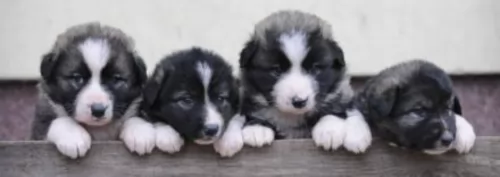 The beautiful Carpatin dog can live to be a healthy 12-14 years if you feed him nutritious foods, provide him with clean water every day, exercise him, give him a dry, warm bed and give him loads of love, attention and care.
The beautiful Carpatin dog can live to be a healthy 12-14 years if you feed him nutritious foods, provide him with clean water every day, exercise him, give him a dry, warm bed and give him loads of love, attention and care.
However every dog can become ill and with the Carpathian Shepherd Dog you certainly want to be aware of ear and eye infections, hip dysplasia and skin disorders.
 There are some genetic problems with this dog breed, although with good care, you are highly unlikely to see your dog with them.
There are some genetic problems with this dog breed, although with good care, you are highly unlikely to see your dog with them.
Some of these are hip dysplasia and epilepsy.
Hips are always a worrisome aspect with dogs as it can bring on lameness. There are some things that can be done to reduce the incidence of hip dysplasia.
Joint laxity in dogs occurs when the head of the femur doesn’t fit into the acetabulum properly. This could be the result of several things such as the dog being overweight, injury or something else.
Epilepsy in dogs is a chronic condition that results in seizures. This neurological disorder is actually a life-long disease, occurring when there is abnormal electrical activity in the brain and which changes a dog’s behavior.
Some breeds are more predisposed to epilepsy than others but you will need to get your dog to the vet when you see your pet jerking uncontrollably. Most of these epileptic fits happen without warning, they last a few seconds to a minute or so and stop on their own.
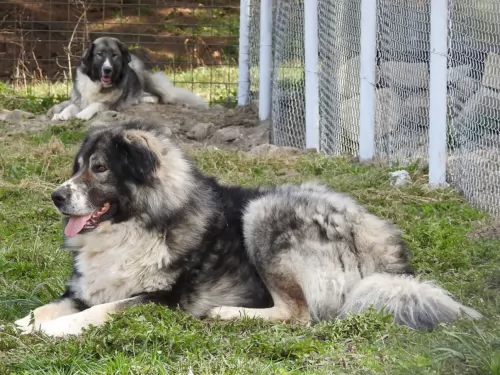 Despite his longish coat, the Carpatin is a low to moderate maintenance dog. To avoid tangles and matting, you’ll need to brush his hair at least twice a week. He won’t however require professional grooming.
Despite his longish coat, the Carpatin is a low to moderate maintenance dog. To avoid tangles and matting, you’ll need to brush his hair at least twice a week. He won’t however require professional grooming.
Dogs with floppy ears will need to have the ears checked to ensure they remain fee of moisture and wax buid-up. The ears can be easily infected when left uncleaned. The nails and teeth should also be checked. Canine toothpaste and brush can help to prevent plaque build-up which can cause gum disease and tooth decay. Not only that, dental disease can lead to other health issues in other parts of the body.
The Carpatin is a medium- to high energy level breed dog and he will therefore need a good amount of exercise to keep him healthy and content. Rope him in to your activities whether you go jogging or cycling. Put him on a leash and take him with – he’ll love it. Dogs who are allowed to be active and part of the family are simply better dogs.
Your Carpatin’s weight, age and activity levels will guide you as to what food is best for him. He needs nutritious food and if you’re unsure how to choose, your veterinarian can advise you on what to look for.
Apart from proteins, your dog needs fats, fiber, carbohydrates, minerals and vitamins. As your dog ages, he or she will go through different life stages, and you want to be sure of ensuring your dog is getting everything he needs to ward of disease and stay happy and healthy.
Make sure your 4-legged canine friend always has a bowl of fresh, cool water available to him.
 It’s no longer cheap caring for a dog – just like with a child, by bringing a dog into your home, you have a responsibility to care for it.
It’s no longer cheap caring for a dog – just like with a child, by bringing a dog into your home, you have a responsibility to care for it.
If you bring a puppy into your home, you will need to feed him 4x a day. If you feed him commercially manufactured food it will need to be specially formulated for puppies. You will have to read on the packaging to make sure you get the right food.
Later on your pet can start having one or two meals a day. Two smaller meals is best as then he doesn’t gobble up his food too fast which can lead to a life-threatening condition known as bloat. Home-made food is always a welcome treat for your pet, but keep it simple and consistent. Boiled chicken, brown rice or pasta and some cooked vegetables such as carrots, sweet potatoes and spinach chopped up and added to his dry kibble can offer him some variety from time to time as well as also adding in some raw meat when you get the chance. He must always have access to fresh, cool water.
Your puppy will be due at the vet for his first vaccinations. Your puppy's first vaccination will usually be at about 8 weeks of age.
Your new pet will require a warm, dry, comfortable place to sleep and to retreat to.
You will need to provide him with chewy toys to stimulate him both mentally and physically.
You will need to exercise your pet – nice long walks, ball- and rope games etc.
Nearly every dog sheds, and the Northern Inuit will require you brushing him twice a week to remove all those loose hairs. During the brushing session, check him over for fleas and ticks and run your hands over him and make sure there are no unusual lumps on his body.